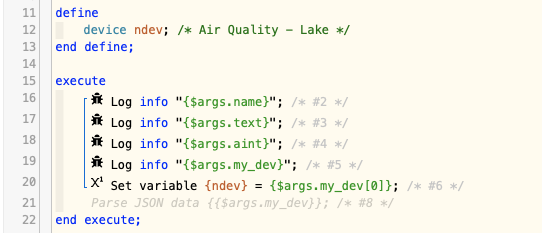1) Give a description of the problem
I can not figure out how to pass a device list as an argument from piston A into piston B and have piston B be able to act on those devices as devices, and not have the device list passed as a string. Can anyone share a working example of passing devices as argument from one piston to another and doing operations with that device list (e.g. more than just printing out piston state info with the device list in piston B)?
2) What is the expected behavior?
Device list passed as argument from piston A to piston B and piston B treats the argument as a device list and not a string.
3) What is happening/not happening?
4) Post a Green Snapshot of the piston![]()
n/a
5) Attach any logs (From ST IDE and by turning logging level to Full)
Some sample problems in various methods I’ve tried:
An error has occurred while subscribing: groovy.lang.MissingMethodException: No signature of method: java.util.ArrayList.startsWith() is applicable for argument types: (java.lang.String) values: [@])
or
+300ms ║║Comparison (error) Device '[:18b776bbd6f14aac8ea57f2fb8e43b53:, :bd35efa8dfd2b841c6965dc8e5286f61:, :cacaf821c48932d6b93929d10a47c705:]' not found is (string) off = false (1ms)


 but I love me some good util methods/pistons
but I love me some good util methods/pistons

